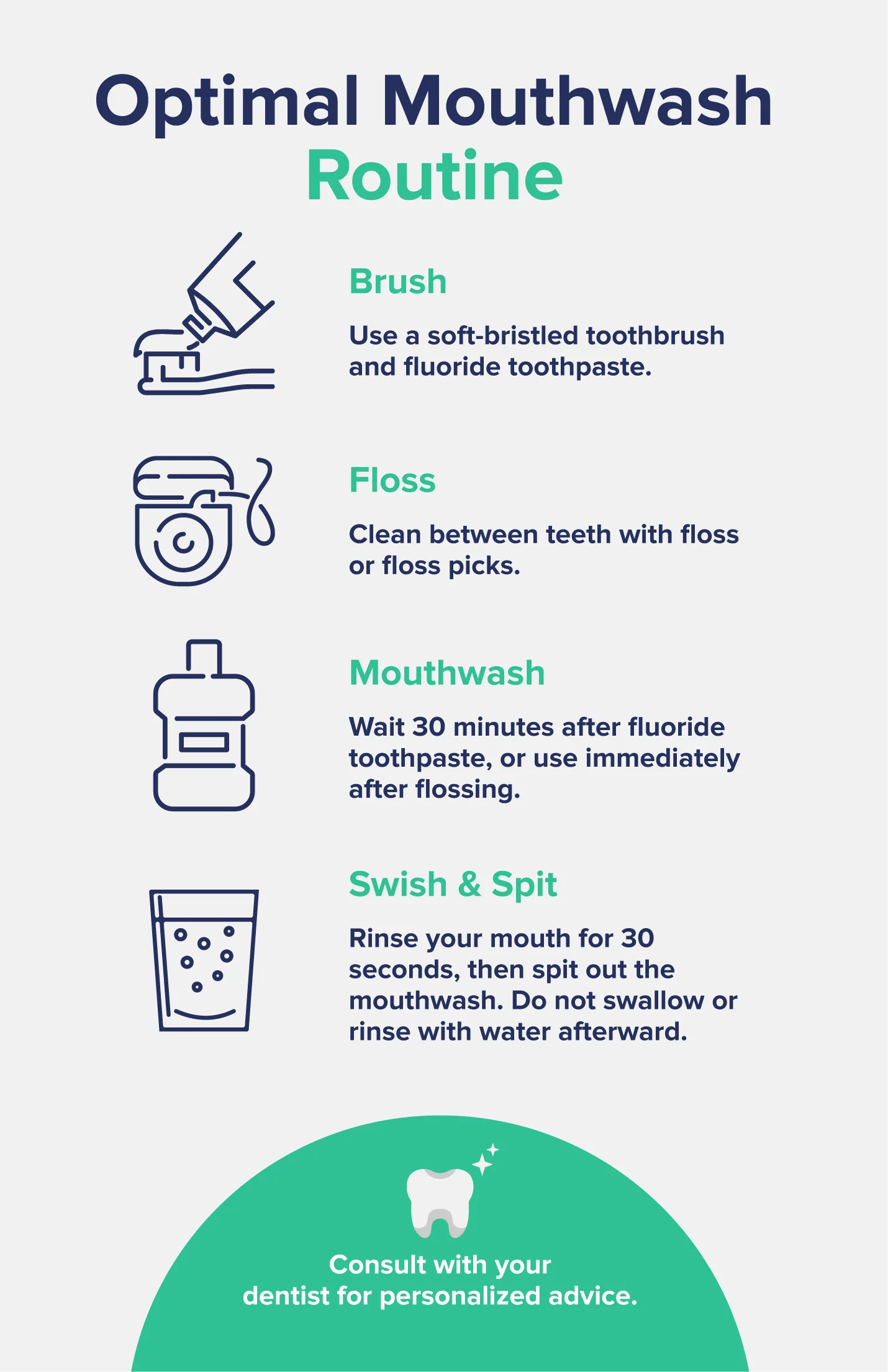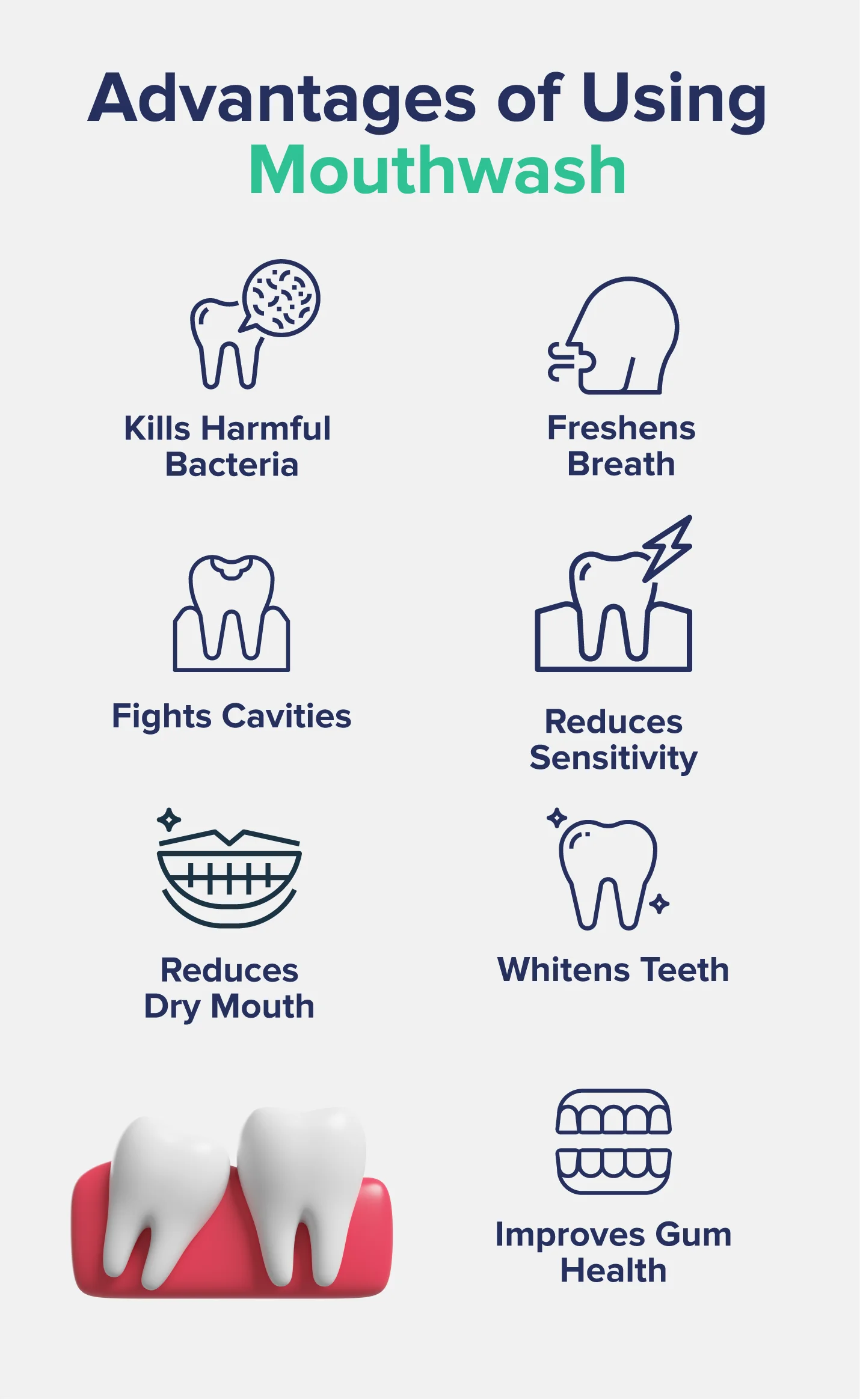Talk to a Registered Dietitian and use INSIDER20 for 20% off!
Talk to a real Dietitian for only $99: Schedule Now
This post contains links through which we may earn a small commission should you make a purchase from a brand. This in no way affects our ability to objectively critique the products and brands we review.
Evidence Based Research To fulfill our commitment to bringing our audience accurate and insightful content, our expert writers and medical reviewers rely on carefully curated research.
Read Our Editorial Policy
Using mouthwash may seem like a pretty simple activity—but how you use mouthwash most effectively depends on what you use it for, what ingredients it includes, and whether or not you use fluoride toothpaste.
Whether you want to know if you should use mouthwash before or after brushing, how to safely use it (including what happens if you swallow a bit of it), and the top ingredients found in mouthwash and how they benefit (or damage) your oral health, we’ve got you covered.
First things first, you should know that mouthwash is never a replacement for your regular oral care routine (i.e., daily brushing and flossing—yep, every day!).
Whether you’re using mouthwash for fresh breath, to fight plaque buildup, or to whiten teeth, effective mouthwash use can be beneficial for tooth and gum health.

For many people, here is a typical oral health routine incorporating mouthwash:
However, as mentioned in the above sections, various health organizations have differing recommendations about mouthwash timing.
Following the ADA’s guidelines, you can use mouthwash before or after brushing based on your personal preferences. If you have specific questions about your oral health or particular dental situation, see your dentist and ask them to tailor a plan for you.
Mouthwash is full of ingredients that may benefit your oral health—but also have a high potential for toxicity if accidentally swallowed.
This is especially true for kids, as their smaller size means that the amount swallowed by a child could have a more severe effect than the same amount consumed by an adult.
If your child swallows mouthwash in any quantity, call the Poison Control Center immediately, where they will ask you details about which mouthwash they drank, how much, if they are experiencing symptoms, and the next steps to take.
The Poison Control Center’s toll-free hotline is 800-222-1222, with operators available 24/7.
If you have children, consider avoiding mouthwash until they are older. The American Dental Association recommends that children under six not use mouthwash at all—even if it says it’s “kid-safe.”
When kids are old enough to start using mouthwash, they should always be supervised and monitored to ensure they do not swallow it.
If you have kids in the house, you should purchase mouthwash with child-resistant packaging and keep it on high shelves that your child cannot access.
Although mouthwashes containing at least 3 grams (0.11 ounces) of ethanol per package must have child-resistant packaging, even an alcohol-free mouthwash can contain potentially harmful ingredients to children.
If you’re an adult, swallowing a small quantity of mouthwash is unlikely to cause any significant adverse effects. However, larger amounts could produce toxic effects like dizziness, drowsiness, trouble breathing, or convulsions in severe cases. Call 911 or the Poison Control Center if these symptoms occur.
To safely use mouthwash, be sure you’re not absentmindedly going about your oral care routine, as you may accidentally swallow the mouthwash in your mouth instead of spitting it out.
You should also only use the amount recommended on the bottle, as larger amounts in your mouth may trigger swallow reflexes or lead to excess mouthwash residue in your mouth after you spit it out.
Overall, swallowing the small leftover amount in your mouth after you spit out your rinse, or drinking water right after rinsing and taking the residual amount with it will be fine—but it may cause some digestive discomfort or throat irritation.
While there is no recommended minimum amount of mouthwash that is safe to consume, if you swallow more than a couple of ounces of mouthwash (like half a bottle or more), keep a close eye on any potential symptoms and be ready to call a doctor or the Poison Control Center or head to the Emergency Room.
Different health organizations have varying recommendations about when to use mouthwash.
For example, doctors at the Mayo Clinic state that mouthwash should be used after brushing and flossing your teeth.
Conversely, the National Health Service in the UK recommends using mouthwash at an entirely different time of day than when you brush your teeth because rinsing the mouth can wash away active ingredients from your toothpaste, like fluoride.
The American Dental Association (ADA) says that you can use mouthwash before or after brushing based on your personal preferences—totally up to you!
However, they also state that certain mouthwashes have a recommendation based on their specific ingredients or therapeutic uses, so take a look at your mouthwash bottle’s label first.
As you can see from these differing recommendations, there is no set rule about mouthwash timing. Overall, if you use fluoride toothpaste, you should wait 30 minutes or more before using mouthwash or rinsing your mouth with any liquid.
If you don’t use fluoride, feel free to use an oral rinse at whichever time is most convenient, whether that’s before or after brushing.
It can also be beneficial to use mouthwash after a meal to remove food debris from those hard-to-reach chewing surfaces—plus, it can help provide fresh breath after a mid-day meal.

Depending on the type of mouthwash used, using mouthwash regularly has potential benefits for many oral hygiene-related areas, such as:
You should wait 30 minutes or more before rinsing your mouth out after using mouthwash.
No, you should not drink water or other liquids for 30 minutes or more after using mouthwash—especially if it is a therapeutic mouthwash with concentrated fluoride or other ingredients to combat a certain oral health issue.
It’s typically recommended to brush your teeth, then floss, then use oral rinses or mouthwash. If you use fluoride-containing toothpaste, wait 30 minutes between flossing and using mouthwash.
Otherwise, feel free to use mouthwash right after flossing. You can also consider using mouthwash after meals for a fresh breath feeling (and for removing food debris).
Each dental professional organization has a different recommendation for this question. The Mayo Clinic recommends using mouthwash after brushing your teeth, while the NHS in the UK states that you should not mouthwash immediately after brushing—it should be used at an entirely different time of day than when you brush your teeth or at least 30 minutes after brushing. This is because mouthwash or oral rinse can remove ingredients like fluoride. However, if you don’t use fluoride-containing toothpaste, this is unnecessary. The American Dental Association recommends using mouthwash at whichever time you prefer, including after you brush your teeth or after a meal.
There are some downsides to using antibacterial or antiseptic mouthwashes—especially alcohol-based ones. Although they do their job of killing bad bacteria and fighting tooth decay, they also kill healthy bacteria, which are necessary for our oral microbiome to thrive. While you may think that the oral microbiome solely impacts your mouth and gums, it actually affects areas all over your body, including strong links to cardiovascular and metabolic health.
Some studies have also suggested that alcohol-based mouthwashes can negatively affect soft tissue in the mouth, which may increase the risk of oral, head, and neck cancers.
Another potential downside of mouthwash is that it can be a temporary band-aid for problems like halitosis (bad breath). Chronic bad breath typically has a root cause that should be addressed, and consistently using mouthwash to cover it up may prevent you from finding a permanent solution.
Mouthwashes that contain chlorhexidine can also cause teeth staining, which may or may not be temporary.
Lastly, some mouthwashes can irritate the soft tissues of the mouth, especially in people with open sores, canker sores, oral lesions, or mouth ulcers.
While most dentists recommend antibacterial mouthwashes, emerging research suggests that mouthwashes that kill bacteria are not as beneficial as we once thought. Unfortunately, many mouthwashes use some sort of antibacterial agent.
Killing off all of the bacteria—good and bad—in your mouth can also deplete oral nitrate-reducing bacteria. This leads to a reduction in nitric oxide availability—a vasodilating compound that is linked to better heart, vascular, respiratory, and immune health.
In a study published in the journal Blood Pressure in 2020, researchers looked at antibacterial mouthwash use and blood pressure rates over a 3-year period. They found that people who used antimicrobial mouthwashes twice per day or more had 85% greater rates of hypertension than less frequent mouthwash users. The twice-a-day users also had more than double the rate of developing high blood pressure compared to non-users.